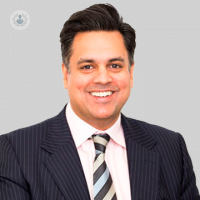What you need to know about robotic surgery
Written by:In this article, highly experienced bowel cancer screening endoscopist, Mr Pasha Nisar, provides a comprehensive overview of robotic surgery and how it is used in colorectal surgery.

What are the key advantages and disadvantages of robotic surgery compared to traditional laparoscopic and open surgery?
The advantages of robotic surgery include highly precise surgery with tiny instruments which can be inserted using keyhole incisions. The surgeon operates the robot from a console with 3D magnified views of the body.
For which types of surgeries is robotic surgery most commonly used, and why?
It is especially useful in pelvic surgery, hernia surgery, and colorectal surgery. Patients recover faster and have less pain compared to some other forms of standard surgery. In oncology, it allows for excellent visualisation and good cancer clearance. Procedures that would be done open with a big cut can now be done using keyhole precision.
What are the ethical considerations surrounding the use of robotic surgery, such as cost, accessibility, and the potential for overreliance on technology?
Robotic surgery requires a platform, and this is expensive. It requires investment and training, and is therefore not widely available for all surgeries yet, but the transformation is currently ongoing.
What are the perspectives of patients and surgeons on robotic surgery? How does it affect their experiences and outcomes?
Surgeons and patients agree that the recovery benefits and high-quality surgery justify the cost, although there are limitations to what the NHS can provide.
As systems develop, it is likely that surgeons will be able to operate remotely and AI is likely to play a role. This is some way off though and for the time being, the surgeon is on the console on the operating theatre at all times.
To book a consultation with Mr Pasha Nisar, just head over to his Top Doctors profile today.


